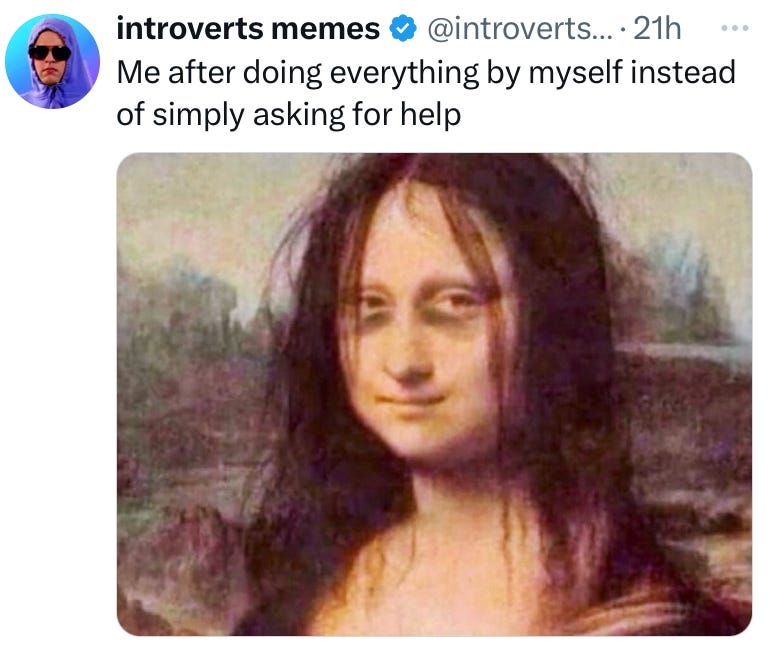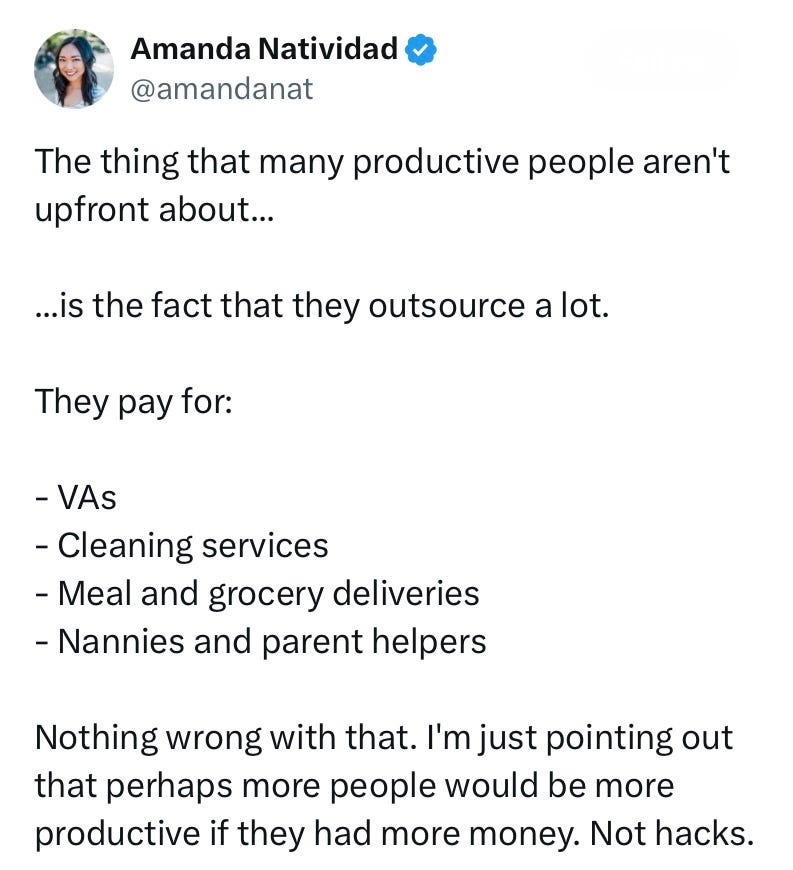Hey, it’s Alexandra. Welcome to my weekly newsletter where I share my latest reflections on professional development and well-being.
If you’re not a subscriber, here’s what you missed recently:
Subscribe to get future posts emailed to you:
This week, I share reflections on:
Overcoming Limiting Beliefs
Why We Struggle to Ask For Help
How to Invest in Your Well-Being
☕️ Read time: 5 mins (best with tea or coffee)
Every March, a former colleague-turned-friend hosts a luncheon for International Women’s Day. This year, eight of us gathered around a doily-covered table for high tea—with an Italian twist.
One of my friend's Nonnas had lent her an antique tea set with the most vibrant turquoise, yellow, and pink designs, while her other Nonna had supplied crystal glasses for us to enjoy some bubbly.
Being the domestic goddess that she is, my friend had teamed up with her mom to make finger sandwiches and fancy desserts from scratch.
I loved the entire spread but I have to give honourable mention to the brownie-style mini cupcakes topped with an Earl Grey frosting they “just whipped up.”
Decadent.
Catching up with people I know from a previous chapter of my life means I inevitably reflect on how I’ve changed.
I’d worked with these women pre-pandemic, long before I’d heard of the Creator Economy or how valuable Twitter is as a learning platform to connect with interesting people. (I’d long believed Twitter to be mostly a political landmine for people like Donald Trump to blast their opponents.)
But a lot has changed since then.
I went on to work at a startup hub, became an entrepreneur, began writing online, and most recently, transitioned from solopreneurship to working in wellness.
My former colleagues have made monumental strides of their own. But our biggest collective stride has been learning the anti-dote to burnout:
You don’t have to do everything yourself.
Reflecting on our tendencies to overburden ourselves in our personal and professional lives reminded me of how burnout increases among women year after year.
As women, it’s in our nature to care for others. But it can come at a dire expense. So it was empowering to remind each other that to be the best version of ourselves for others we have to put ourselves first.
Overcoming Limiting Beliefs
One of the things I shared with the group was how drained I was trying to keep up with my house chores on top of work, socializing, exercising, volunteering, writing, and carving out time to relax.
As someone who likes my home spotless and sparkling, I had long told myself that someday I would gift myself with a cleaner to lighten my load. But I always found myself deferring to the future.
When I was early into my career, I deferred to “when I have a good job,” then it became “when I’m making more money,” and most recently, I deferred to “when I have kids.”
But in chatting with these ladies who are at various stages in their lives—some younger, some older, some married and mothers—I realized I was holding myself back.
The longer I deferred getting the help I wanted, the more time and energy I was draining. Meanwhile, I could be recalibrating for more enjoyment.
The root of my deference was a limiting belief—one that sprouted from a seed planted in childhood.
Limiting Belief #1
I learned from a young age to attribute house cleaners to luxuries for wealthy families. So even though things have changed and now having a house cleaner is more common, it’s still difficult for me to embody that change.
I still think of having a cleaner as a “luxury” and having cleaned up after myself throughout my adult life, it seemed strange to ask someone to pitch in.
Many great women I know share this qualm.
Take, for example, one of my childhood friends with a baby. I recently asked why she kept stalling on getting a cleaner despite continuously saying she needed one.
She replied with an exasperated sigh, “How can I justify getting a cleaner when my mom and mother-in-law did it all themselves?”
I was aghast. From my vantage point, my friend’s mom and mother-in-law want the best for her. So I know they’d feel terrible that my friend was refraining from getting help out of “solidarity.”
But many of us feel the shame of not being able to “hack it” like our parents did.
I’ve lost count of how many new parents have deadpanned me with “I don’t know how my parents did it, let alone yours with four kids.”
Whether it’s an inability or lack of desire to do as our parents did, it’s hard to break free from generational patterns without feelings of guilt or doubt.
But enduring unnecessary struggle out of “solidarity” with our parents is at odds with their desire for us to be the happiest, healthiest versions of ourselves.
Limiting Belief #2
Another limiting belief of deferring help needed now to “when I have kids” is the illusion that new parenthood is an optimal time to add more changes to our lives.
Several new parents have told me they made a grave mistake holding off to get a cleaner because now they’re “too bloody exhausted” to find one let alone get on a schedule.
Limiting Belief #3
Finally, several other people I admire who don’t have kids have cleaners. I think it’s great they benefit from the help and are less likely to be run down.
So why wasn’t I viewing myself as equally worthy of that support?
Having unpacked all of this over lunch, I left our tea party resolved to finally get a cleaner. But as I strolled to the metro, I thought to myself “Great, I’ve decided. But now it’s going to be hard to find someone.”
I felt my momentum slipping away. But I decided I would not be derailed this time.
Once I got home, I fired off requests for referrals in a couple of group chats and guess what? Fast forward five days and a cleaner was at my place doing the job I’d been agonizing over.
I couldn’t believe it.
It was a sign from the universe that my decision and initiative to finally follow through was all it took to manifest the help I needed.
All I could think afterwards was “Why the hell didn’t I do this sooner?”
Why We Struggle to Ask For Help
Beyond limiting beliefs about the need to do as our parents did, many of us struggle to ask for help because we underestimate how much help others are getting behind the scenes—particularly those we perceive as “productive” and “successful.”
As far as my professional life goes, my biggest regret from my solopreneur era was allowing myself to be deluded.
For the better part of my two-year run, a handful of social media figures flying the solopreneur flag had me believing they were achieving financial freedom by operating as a “business of one.”
But in reality, they had substantial support behind the scenes.
Having eventually burnt myself out last year by delusionally thinking “If I keep working hard enough, I’ll eventually succeed like they have,” I see it as my duty to caution you to learn from my mistake.
In hindsight, I would tell my younger self to put more weight on the context of someone’s success rather than the results (which can be massively skewed based on misleading inputs).
If you’re a vintage Everybody Loves Raymond fan, you’ll remember the iconic episode where Marie, the judgemental Italian grandmother, gets busted sabotaging her daughter-in-law, Deborah, in the kitchen.
Unbeknownst to Deborah, Marie tampers with a key ingredient for a recipe she’s using to replicate one of Marie’s signature dishes.
Deborah attempts the recipe over and over again to no avail. But when she finally gives up, she notices the label on a key ingredient peeling off—unmasking a different one as the source of her failure.
My point is, blindly following a “recipe for success” is a recipe for failure when you haven’t verified the ingredients.
It’s great to admire the achievements of others and draw inspiration from their journeys but even well-intentioned advice can be horribly misleading.
Context and nuance are important. So cast a keen eye on “solopreneur” labels and consider how other people’s definitions may differ from yours.
Don’t take it at face value like I did. I tried to do everything myself. But I couldn’t, no one can.
My life is way healthier now that I’m back to working standard hours and asking for help—like in the case of getting a cleaner.
How to Invest in Your Well-Being
A funny thing about finding the confidence to ask for help is we then have to contend with receiving it. Many of us feel weirdly exposed in doing so.
Take me, for example. Once I’d lined up a cleaner, my first thought was “Before she comes, I need to clean my apartment.”
Likewise, a high school friend of mine who’d also gotten a cleaner recently has the same frantic instinct to “clean before the cleaner comes.”
But we’ve realized we have ridiculously high standards and what constitutes untidy for us is nothing compared to what cleaners are used to.
So rather than draining ourselves to make our places spotless and sparkling before our cleaners come, we have to establish a reasonable state that doesn’t negate the purpose of having one.
It’s a work in progress. But getting a cleaner has been a major investment in my well-being. The first time mine came was a Saturday and I wound up writing my weekly post simultaneously.
I was immensely grateful to be able to focus on writing without “I need to clean and vacuum” at the back of my head.
Instead, I got a burst of energy to do the laundry I’d been stalling on and afterwards, I did a bunch of smaller jobs like reorganizing my cupboards. All because I was elated to have someone check the big ticket items off my list.
I was in heaven the next morning as I walked into my pristinely-cleaned kitchen to make coffee. For several days after, a feeling of appreciation carried me around with a lightness I hadn’t felt in ages.
It made me cognizant of how much easier I could make my life if I were to ask for and graciously receive help more often.
Now, rather than being stretched thin on weekends trying to squeeze in cleaning on top of everything else, I can spend time enjoying myself, relaxing, and writing posts like these.
But it’s important to note that you don’t necessarily have to pay for help.
Simple Things You Can Do For Free
Years ago, one of my aunts told me about a brilliant ritual she and her girlfriends came up with to make meal prep for their families more enjoyable.
As moms of school-age children who needed to be shuttled to soccer practice, birthday parties, and so on, my aunt and her friends found dinner prep to be one of the most draining tasks on their agendas.
So they decided to help each other out.
Instead of each mom struggling to organize their meals for the week, they decided to coordinate Sunday playdates so that together they could whip up four lasagnas, four portions of pasta sauce, and four more of whatever else was on the menu that week.
In the meantime, their kids entertained each other and the moms enjoyed themselves among friends, music—and occasionally wine. By the end, each mom had five dinners prepped for the week and felt fantastic.
The key takeaway from this story is you have to articulate your challenges to drum up creative solutions. Had my aunt and her friends pretended they were “fine” doing everything themselves, they would’ve continued to struggle.
But in opening up, they found common ground and realized, “Hey, maybe we could help each other.”
What better reason to articulate your needs than to graciously receive support?
Now that some of my closest friends have babies and we’re all generally more intentional about our time, we’ve been talking about following in my aunt’s footsteps. I know she’d love it and recommend some tunes.
My question to you is, what help can you ask for to enhance your well-being?
Consider this a “sign” to follow through.
Thanks for reading and have a wonder-full week,
P.S. A Special Message For My Fellow Canadians
In the spirit of making more time to do meaningful activities, I’m proud to be participating in BMO Walk So Kids Can Talk.
This event on May 5th is a fundraiser on behalf of Kids Help Phone, an organization that’s been supporting youth wellness for 35 years.
If you’re keen to support young people across Canada with free, confidential, 24/7 and multilingual mental health care, please consider making a small donation.
Some kids have gone as far as to say the counsellors they’ve encountered at Kids Help Phone have offered them safe spaces to share candidly what they haven’t been able to share with any other adult.
I’m proud to be walking for such an important cause alongside some wonderful colleagues. You can read more and donate here.
Thank you in advance for making care more accessible to our youth.
I appreciate you,
💛 Like or comment if you enjoyed this edition.
☕️ Reach out to grab coffee or tea in Montreal.






Reading this made me realize that I need to hire a cleaner... thank you Alexandra, for the push to ask for help rather than constantly trying to do everything, everywhere, all at once!
"Another limiting belief of deferring help needed now to “when I have kids” is the illusion that new parenthood is an optimal time to add more changes to our lives." — I don't know if you meant for this line to be funny, but I certainly burst out laughing.
I resonate with your message here Alexandra. We could all use a confidence boost when we need to ask for help. This post gave me that.